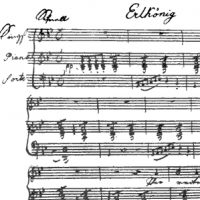Text into Music
|
Grant Chu Covell [April 2000. Originally appeared in La Folia 2:4.]
Text into music is the worse of two evils. Either the text isn’t worth setting, or should be left alone, or else the music doesn’t need the text or is completely senseless without the text. This isn’t symbiotics, this is natural selection. (For example: 1. While I admire Carter, I have no interest in his songs. 2. A recent WHRB orgy a few years back of Schubert really turned me off his songs except for the dozen we all know and love. 3. I own Schoenberg’s songs, but I never have the patience.) Words that are important to me, or that I like, I have trouble fessing up to and would rather not set. Words I’ve set, are usually very short, or explicit enough so that the music becomes a gloss. Though I did do a nice tonal work last summer (for High School Chorus and instruments) which violates everything I say here. In general, I’ve looked for things which shouldn’t be set: the warning on a Sweet and Low package, train tickets, the telephone book, etc. And most recently, the text is ignored and the letters, words and phrases (sometimes in alphabetical order) become fodder for a gloss. Why? One step away from what the words explicitly signify and then you can work with a setting of the context of the words. Look at those nose deep into programs, thinking the song is 7/12ths over because that’s what line is being sung. That Urlauten sonata (Ursonate by Kurt Schwitters) is significant not that I find it influential (it’s like Ms Foster Jenkins), but rather that it’s representative of the way texts can be deconstructed (or mangled, or ignored). In truth, I am contemplating a real song cycle for voice & piano, with real settings of words, but the text is not poetic (they’re puzzles). I didn’t mention the theatre aspect, and how I think it’s messed up all composers. Has good music has come about since Pierrot where instruments + music + words doesn’t become theatre? This probably confuses the point somewhat as who would write a work for voice + piano, when voice + piano + brick is more fun (I confess to trombone, 8 music stands and cinderblock). I don’t think this is Pierrot’s fault (well, Schoenberg’s fault), but when something by Deak or HK Gruber or that Eight Songs for a Mad King (Peter Maxwell Davies) or Crumb is so much more fun than Schubert, I think someone will write that flashy theatrical piece. Never mind about audiences having zero attention span to a nice dresser in the crook of a piano. Audiences will fixate on that bucket of hay on the stage, or the tambourine, or wonder why the pianist has a whistle around his/her neck. I am actually listening to some of Holliger’s songs right now (countertenor + clarinet + accordion + bass). These are virtuosic. They reflect the music. They are somewhat exact settings, but there’s a clear attempt to have a psychological aspect through the instruments. The countertenor is self-referential. The accordion and bass can recall another tradition, etc., etc. This is how you write real songs today. Maybe that’s why the straight song setting went away. We do not sing Rorem in the streets (he probably does, and that’s good for him). We could probably extend this to the failure of 20th/21st century opera. Where do we go after something like Zimmermann’s Die Soldaten? That’d be a fun topic. So, if you had dreamed up a theatrical aspect to your poems, you might have more takers. I wont add stage directions for you (“spoken through a glass of water”, “on tiptoes”, “as if walking through salt flats,” “arms pointed NNE,” “lit from below by a Coleman lantern”), but you see what I mean. (I didn’t mention Beckett before, but Beckett really helped this along as well, as much of his stage word removed the need for music and speech. And besides the telephone book, I’ve set the obvious amounts of Beckett and Joyce. Yeats is a favorite too.)
[Previous Article:
Early Modulations: Vintage Volts]
[Next Article:
Stockhausen’s Helikopter-Streichquartett]
|
